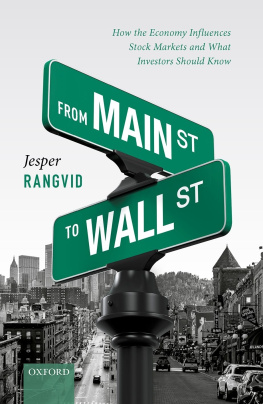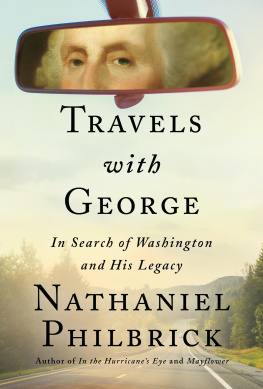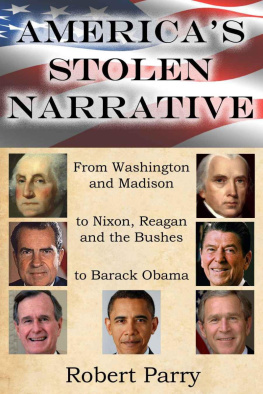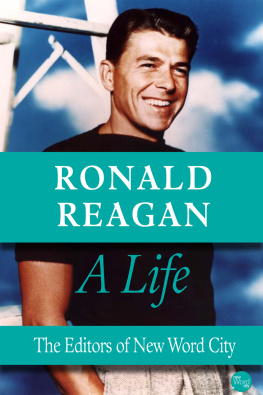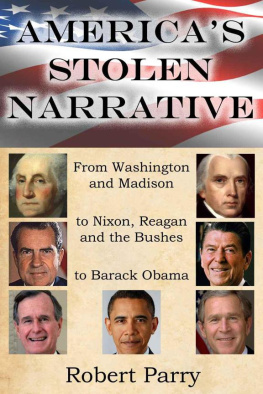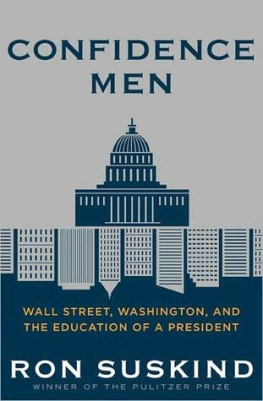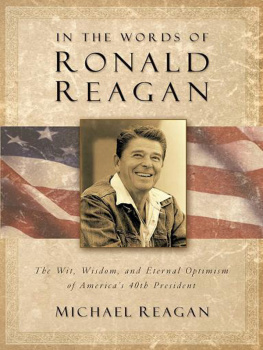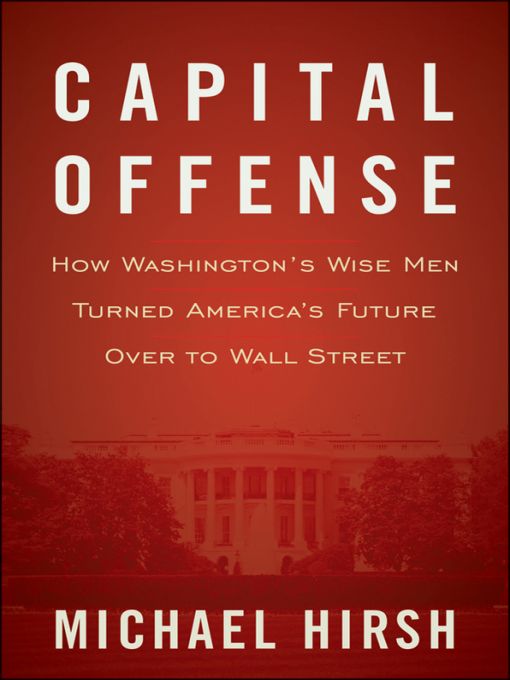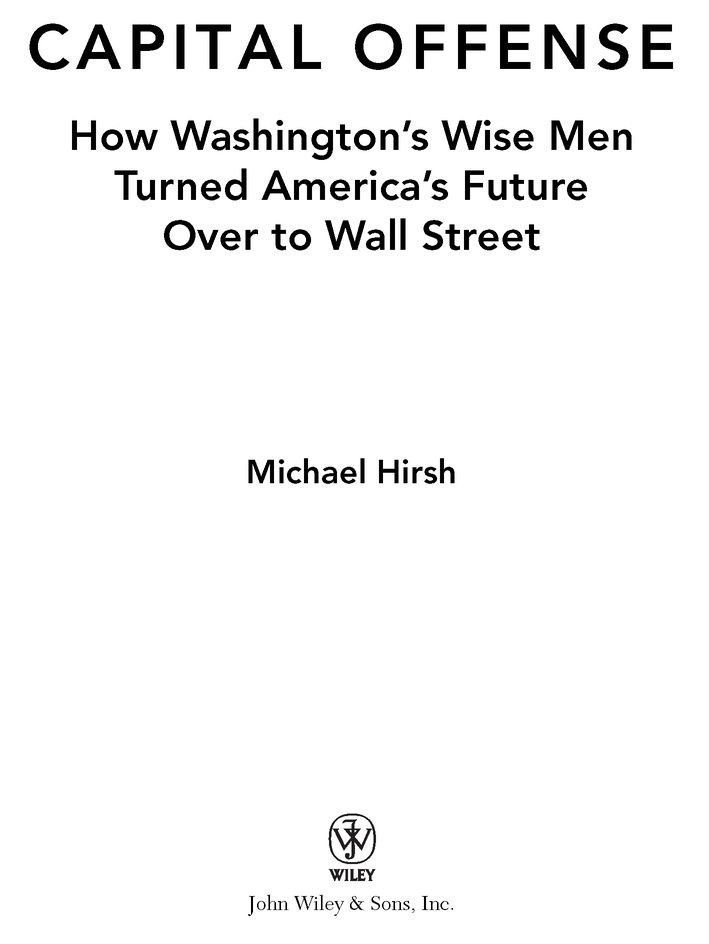Table of Contents
For my parents, Charlie and Barbara,
and my sons, Evan and Calder
Acknowledgments
The bulk of this narrative was drawn from scores of interviews with the principal characters in the story, their aidescurrent and formeras well as their detractors and critics and close observers of the economic scene over the last two years. This was supplemented by reporting I have done going back some twenty years, mainly for Newsweek magazine but also for Institutional Investor magazine and the Associated Press.
I have had the great fortune to have been, as a journalist, a front-row witness to the rise of the post-Cold War world as well most of the financial crises that have plagued it since the Mexican peso crash of 1994- 1995. I was able to cover most of the events described in this book in real time, as they were happening, and it has been fascinating and enlightening to return to them for a second look from the perspective of the biggest crisis of all, the financial meltdown of 2007-2009.
Unless otherwise noted, the events, scenes, and discussions described in the narrative are based on my own reporting and interviews. Some of the interviews were on background, meaning the individuals would agree to speak to me only on condition that I not attribute any quotations to them by name in the text, but most were on the record. I would like to thank the following people who gave me their time, attention, recollections, assessments, and views. Together they contributed inestimably to whatever value this book may have.
They are, alphabetically: George Akerlof, Martin Anderson, Robert Auerbach, Sheila Bair, Peter Bakstansky, Roy Barnes, Charlene Barshefsky, Gary Becker, Ben Bernanke, Peter Beutel, Jagdish Bhagwati, Alan Blinder, Joan Blumenthal, Leonard Bole, Bill Brennan, Mark Brickell, Brooksley Born, James Bothwell, Chuck Bowsher, Barbara Branden, Nathaniel Branden, Charles Brunie, Michael Calhoun, Maria Cantwell, Chris Carpenter, Gerald Corrigan, John Dingell Jr., Randall Dodd, Kathy Eickhoff, Stanley Fischer, Roberta Fishman, Barney Frank, Tim Geithner, Gary Gensler, Mark Gertler, Newt Gingrich, Harvey Goldschmid, Austan Goolsbee, Michael Greenberger, Rob Johnson, Sally Katzen, Ed Knight, Eric Kolchinsky, Jan Kregel, Anne Krueger, Marc Lackritz, Jim Leach, Arthur Levitt Jr., Iris Mack, Patrick Madigan, Reuben Marks, Janet Martel, Thomas P. Mack McLarty, Richard Medley, Leo Melamed, Tom Miller, Kevin Muehring, Paul ONeill, Jonathan Orszag, Peter Orszag, Frank Partnoy, Hank Paulson, James Poterba, Lant Pritchett, Raghu Rajan, Robert Reich, Dani Rodrik, Kenneth Rogoff, Jim Rokakis, David Rubenstein, Robert Rubin, Anna Schwartz, Robert Shiller, George Shultz, Paul Singer, Roy Smith, Gene Sperling, Robert Solow, Anya Stiglitz, Eloise Stiglitz, Joseph Stiglitz, Larry Summers, Robert Teitelman, Sidney Verba, Paul Volcker, Dan Waldman, Timothy Wirth, Lawrence White, Jim Wolfensohn, and Edgar Woolard.
I want to reserve special thanks for the people who read early drafts of this book. They corrected many errors and gave me incisive and invariably helpful advice on how to make it better. Ken Rogoff, Rob Johnson, Steve Weisman, and Angel Ubide all took time out of their busy schedules to critique the manuscript in great detail, and they improved it in more ways than I could possibly enumerate. I will always be grateful to them. Frank Partnoy and Governor Roy Barnes read parts of the manuscript and also helped to make it more accurate. Michael Greenberger did so as well and was an infallible guide through the arcane netherworld of derivatives regulation. My Newsweek colleague Bob Samuelson, the great and humble dean of American economic columnists, has been a constant intellectual and journalistic mentor to me over the years, and he supplied some of the critical reporting details in the book, especially concerning the Jackson Hole meeting of 2005, which he attended.
Any mistakes or misjudgments in this book, however, remain mine alone.
I would also like to thank my editors at Newsweek. I did not take a leave of absence to write this book, and they were unfailingly sensitive and supportive as I tried to balance my time between authorship and my Newsweek work.
My editor at John Wiley & Sons, Eric Nelson, was a pleasure to work with from the start. Eric defines editing at its best. He dove into the manuscript with brio and proposed many changes, yet he didnt insist on a single one. I often pushed back, but in almost every case his judgment was right, and this is a far better book than it started out to be because of his handiwork in every chapter. Kimberly Monroe-Hill of Wiley unerringly supervised the copyediting, proofreading, and indexing of the book, along with everything else on the way from Word documents to printed copies. My agent, Andrew Stuart, helped enormously in refining the concept of the book, and when he eventually liked what he saw he set about selling it like a warrior. Andrew has been a constant source of support and advice.
Finally, I would like to thank my entire family, including the very earliest readers of my prologue, my sister Kim Hirsh and my brother-in-law Mark Widmann. My parents, Barbara and Charlie, have advised me well and lovingly on this project, as they have on everything else important in my life, and no thanks will ever be enough to convey the love and gratitude I feel. My sister Lisa Hirsh Schlossman has also always been there for me, and I would like to add a special thanks to her (and her husband Marks) daughter and my niece Samara Schlossman, who is showing promise as a family historian and who thought it would be really cool to be mentioned in the acknowledgments. Thanks also go to Denise for understanding, and to our wonderful sons, Evan and Calder. They are the joy of my life, and for me the greatest pleasure while writing this book was to watch them growing up into the outstanding young men they are destined to become.
PROLOGUE
The Hippopotamus under the Rug
It was the last thing Bob Rubin needed that day, at that moment in history. It was April 21, 1998. Rubin, the Treasury secretary of the United States, was in the middle of a financial crisis that was toppling one Asian economy after another. So it really was not convenient to have this humorless, difficult woman, Brooksley Born, marching into his magnificent Greek Revival palace next to the White House, his Treasury Department, to lecture him about the dangers of derivatives. Born, that busybody from a minor regulatory agency. Born, with her pixie bangs and droning personality. Her ridiculous brown legal folder, from which she neatly extracted her talking points, and her litigators demeanor. Born was most definitely not a member of the club; she had no sense of the smooth collegiality that characterized the top policy makers of the Clinton administrationwhat former Treasury secretary Lloyd Bentsen, with some exasperation, had once called the meetingest administration he had ever seen. So what if she was running a nominally independent agency? She had no sense of place, no respect for who they were. And it wasnt just the Clintonites. Over at the Federal Reserve a few blocks away, where Rubins pal Alan Greenspan reigneda man who for ten years had surgically thwarted every effort at regulationstaffers privately thought of Born as a lightweight wacko, recalled a former Fed official.



